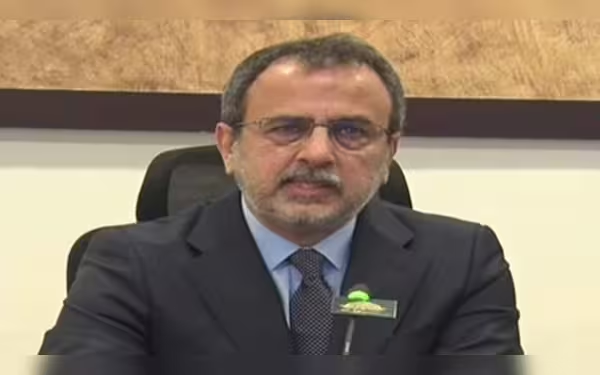Saturday, November 16, 2024 07:23 PM
Pakistan's Energy Future: Minister Leghari Unveils Concrete Strategy
- Concrete strategy to meet future energy demands announced.
- 17,000 MW of renewable energy expected by 2034.
- Plans to privatize three DISCOs within three years.
 Image Credits: urdupoint
Image Credits: urdupointMinister Leghari announces a concrete strategy to address Pakistan's future energy demands, focusing on renewable energy and sector reforms.
In recent years, Pakistan has faced significant challenges in meeting its energy demands. With a growing population and increasing industrial activities, the need for a robust energy strategy has never been more critical. The government has recognized this pressing issue and is taking steps to ensure that the country is well-equipped to handle future energy requirements.
On Tuesday, Minister for Power Division Sardar Awais Ahmed Khan Leghari announced that a "concrete strategy" is now in place to address the future energy demands of Pakistan. Speaking at a function at the National University of Science and Technology (NUST), he emphasized the importance of energy in driving the economy. "As energy always plays a key role in the economy of the country, the generation, transmission, and distribution system of the energy sector is being revamped on modern lines," he stated.
One of the key components of this strategy is the promotion of environmentally friendly renewable energy sources. The minister revealed that approximately 17,000 megawatts (MW) of renewable energy are expected to be added to the national grid by 2034. This move not only aims to enhance energy production but also aligns with global efforts to combat climate change.
However, the minister acknowledged that the past approach to energy generation has not been optimal. He pointed out that the generation aspect of the power sector has not been developed in a cost-effective manner. "We are committed to adding generation on a least-cost methodology basis in the future," he assured. This commitment is crucial for ensuring that energy remains affordable for consumers.
Addressing the challenges posed by Independent Power Producers (IPPs), Leghari expressed gratitude for their cooperation in revising contract conditions. He emphasized the need for a competitive market in the energy sector, stating that power generation should primarily be driven by the private sector. "There should not be a single purchaser like the Central Power Purchasing Agency (CPPA) in the country," he remarked, highlighting the importance of competition in reducing electricity prices.
The minister also shed light on the financial burdens faced by power distribution companies (DISCOs). He revealed that a staggering sum of Rs 595 billion is budgeted annually to cover losses and power theft. "It is unbelievable, unacceptable, and also not sustainable," he stated, indicating the urgent need for reform. To address these issues, he mentioned that capable professionals would be appointed to the boards of these companies to enhance their efficiency.
Looking ahead, Leghari announced plans to privatize three DISCOs within the next three years, while two others, which are incurring Rs 150 billion in losses, will undergo concessional model reforms. This strategic move is expected to improve the overall performance of the power distribution sector.
Furthermore, the minister discussed the restructuring of the National Transmission and Despatch Company (NTDC). He noted that the board was previously ineffective but is now being led by a senior advisor from LUMS. The NTDC is set to be divided into three entities, which is anticipated to streamline operations and enhance efficiency.
The steps being taken by the government to revamp Pakistan's energy sector are commendable. By focusing on renewable energy, promoting competition, and addressing inefficiencies, the country is on the path to a more sustainable and reliable energy future. As these changes unfold, it is crucial for all stakeholders, including consumers, to stay informed and engaged in the ongoing transformation of the energy landscape in Pakistan.













